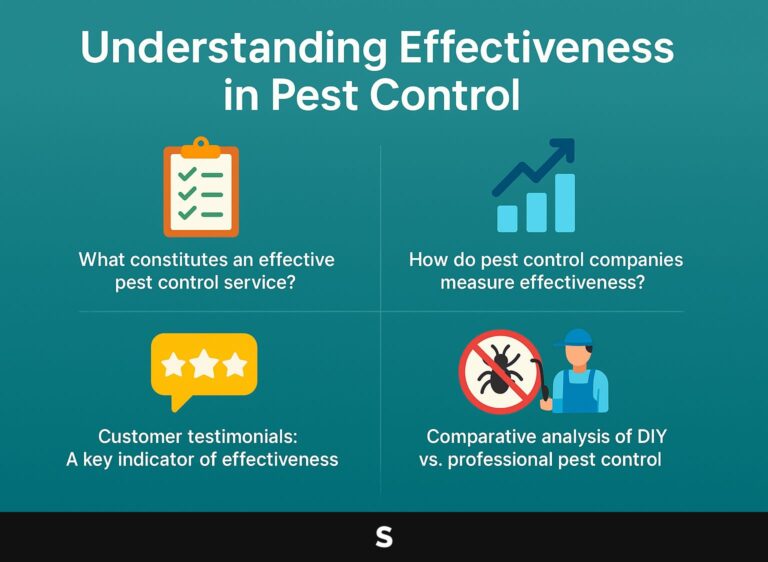Law Firm Reviews That Build Client Confidence
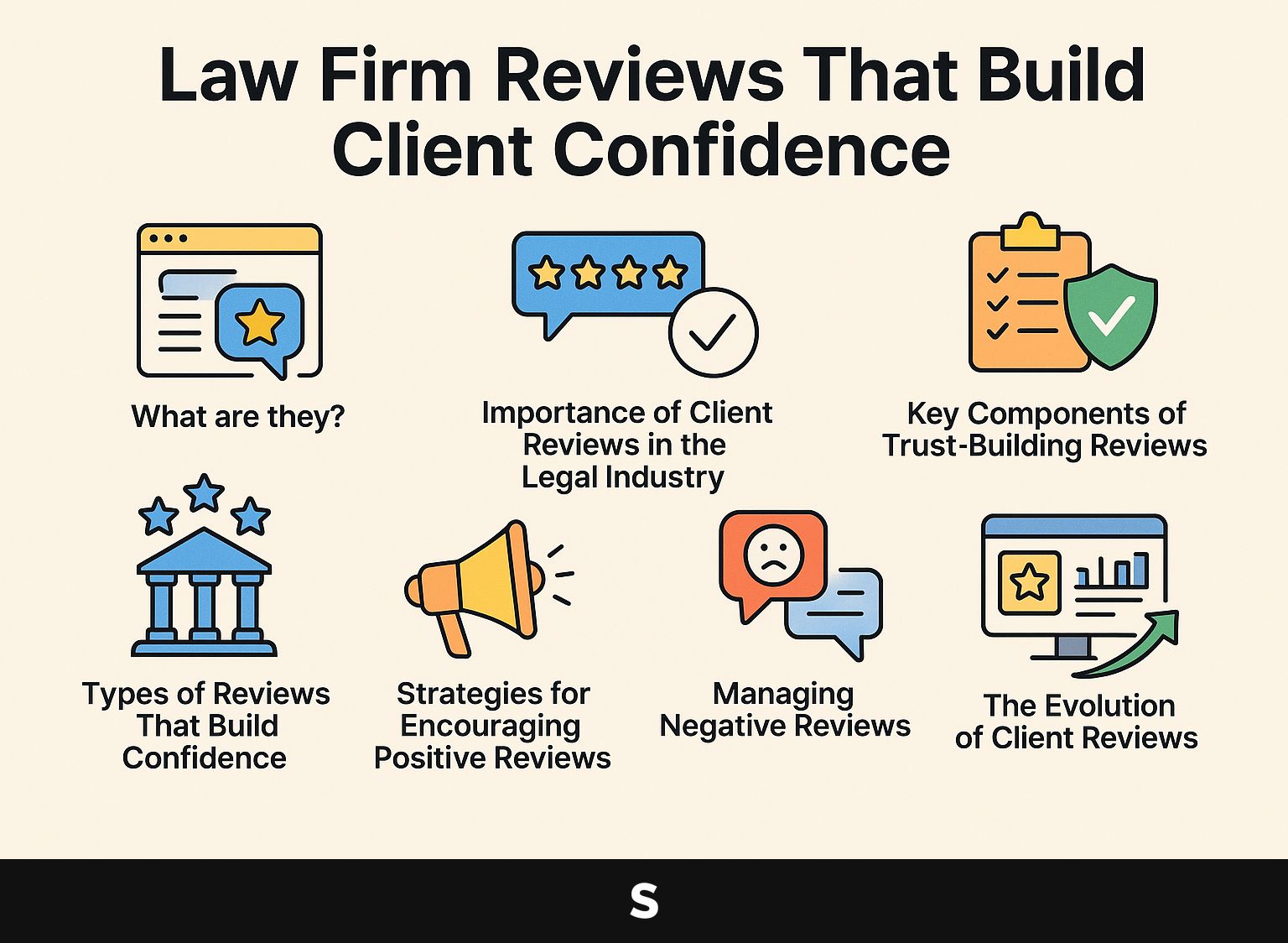
Law firms now need to gain client trust by gathering genuine online reviews. Websites like Google, Yelp, and Avvo matter for a firm’s reputation. It’s important to collect reviews that attract new clients.
This article looks at how managing your reputation with trust-building reviews can improve your firm’s credibility, bring in new clients, and create lasting relationships. Learn how to turn client feedback into a useful resource for achieving success in the legal field.
Key Takeaways:
- Positive reviews can significantly influence potential clients’ decisions to choose a law firm, emphasizing the importance of building trust through reviews.
- Specific and emotionally resonant reviews are key components of trust-building reviews, adding credibility and relatability.
- To effectively use reviews for marketing and SEO, law firms must ask for reviews effectively, manage negative reviews, and stay compliant with legal and ethical guidelines.
- Law Firm Reviews That Build Client Confidence – What are they?
- Importance of Client Reviews in the Legal Industry
- Key Components of Trust-Building Reviews
- Types of Reviews That Build Confidence
- Listening to client feedback can help lawyers offer services that meet client needs, leading to better results for everyone.
- Strategies for Encouraging Positive Reviews
- Managing Negative Reviews
- Using Reviews for Marketing and SEO
- Client Feedback: How It Has Changed Over Time
- Legal Compliance and Ethical Considerations
- Measuring the Impact of Reviews
- Frequently Asked Questions
- 1. What is the importance of law firm reviews in building client confidence?
- 2. How do positive law firm reviews reflect a firm’s professionalism and dedication?
- 3. How can law firm reviews help potential clients make informed decisions?
- 4. Why do detailed and customized law firm reviews help in increasing client trust?
- 5. How do law firm reviews on Spokk.io differ from other review platforms?
- 6. How can law firms use reviews on Spokk.io to showcase their strengths and attract new clients?
Law Firm Reviews That Build Client Confidence – What are they?
Law firm reviews are important for gaining client trust, which affects how firms attract and keep clients. Spokk.io highlights the importance of feedback to build trust.
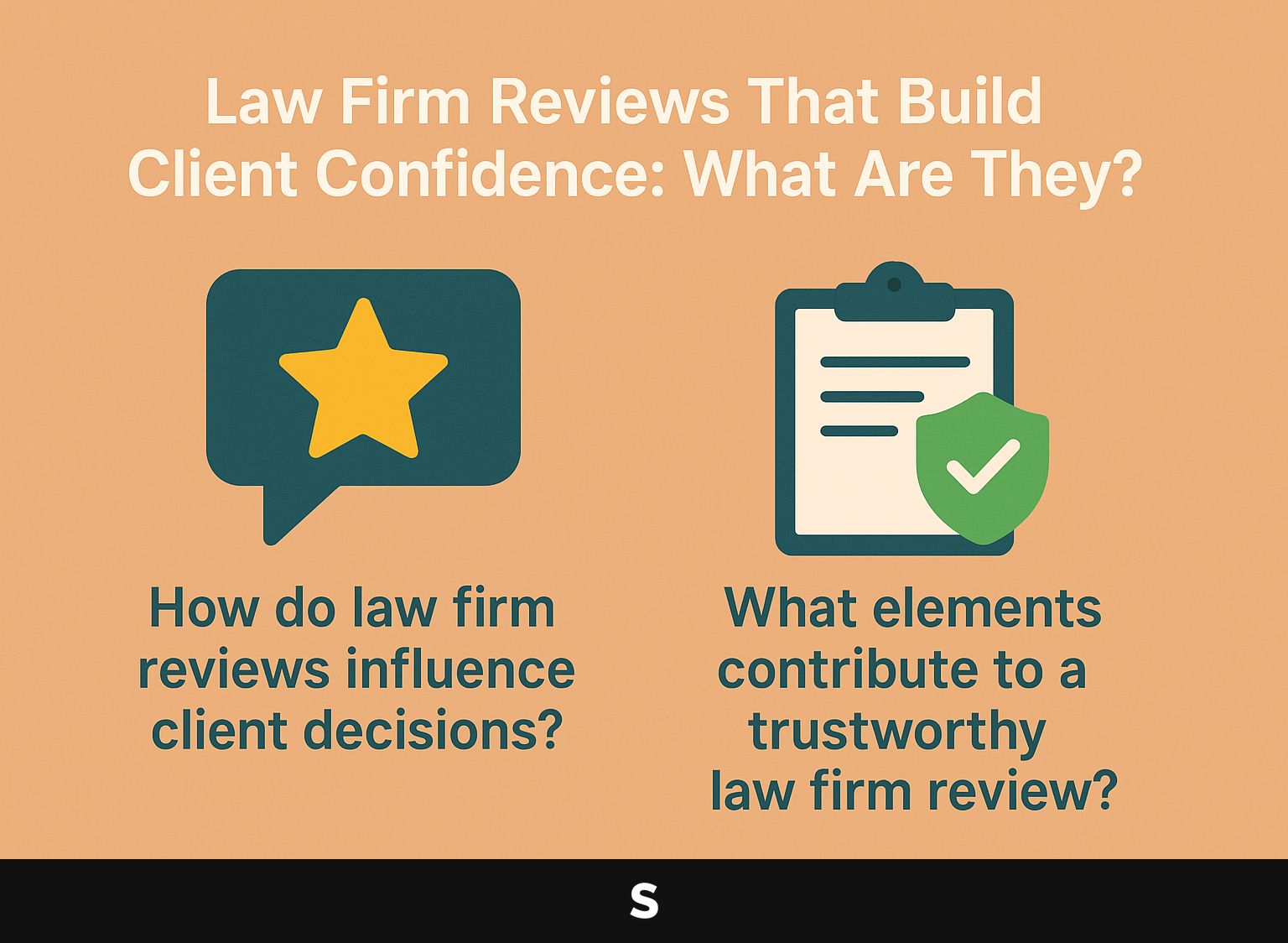
1. How do law firm reviews influence client decisions?
Client decisions are heavily influenced by reviews, with 84% of people trusting online testimonials as much as personal recommendations, showcasing their power in the legal sector.
Recent studies reveal that law firms with a higher average rating-4.5 stars or more-can experience up to 30% more inquiries than those with lower ratings.
In particular, a survey by BrightLocal found that 77% of consumers read reviews before contacting a business, with 92% stating they would reach out to a lawyer with positive client feedback.
Firms that actively manage their online reputation can increase client retention by effectively addressing negative comments and showcasing positive experiences. Building a strong review presence draws clients and establishes lasting trust.
2. What elements contribute to a trustworthy law firm review?
Key elements such as detailed feedback on attorney-client interactions, transparency about case outcomes, and emotional resonance contribute significantly to the credibility of law firm reviews. Reviews that mention specific experiences, like Attorney Johnson’s commitment to knowing client concerns, build trust.
A review might explain how she handled a complicated family law case, leading to a fair result and providing emotional help during the process.
Openness is important; potential clients value reviews that talk about the realistic results of cases instead of only positive summaries. Being truthful builds a relationship with potential customers, increasing their chances of selecting your services.
Importance of Client Reviews in the Legal Industry
What clients say is very important in the legal industry. It can strongly influence a law firm’s reputation and help attract new clients. Firms have used reviews to grow their business.
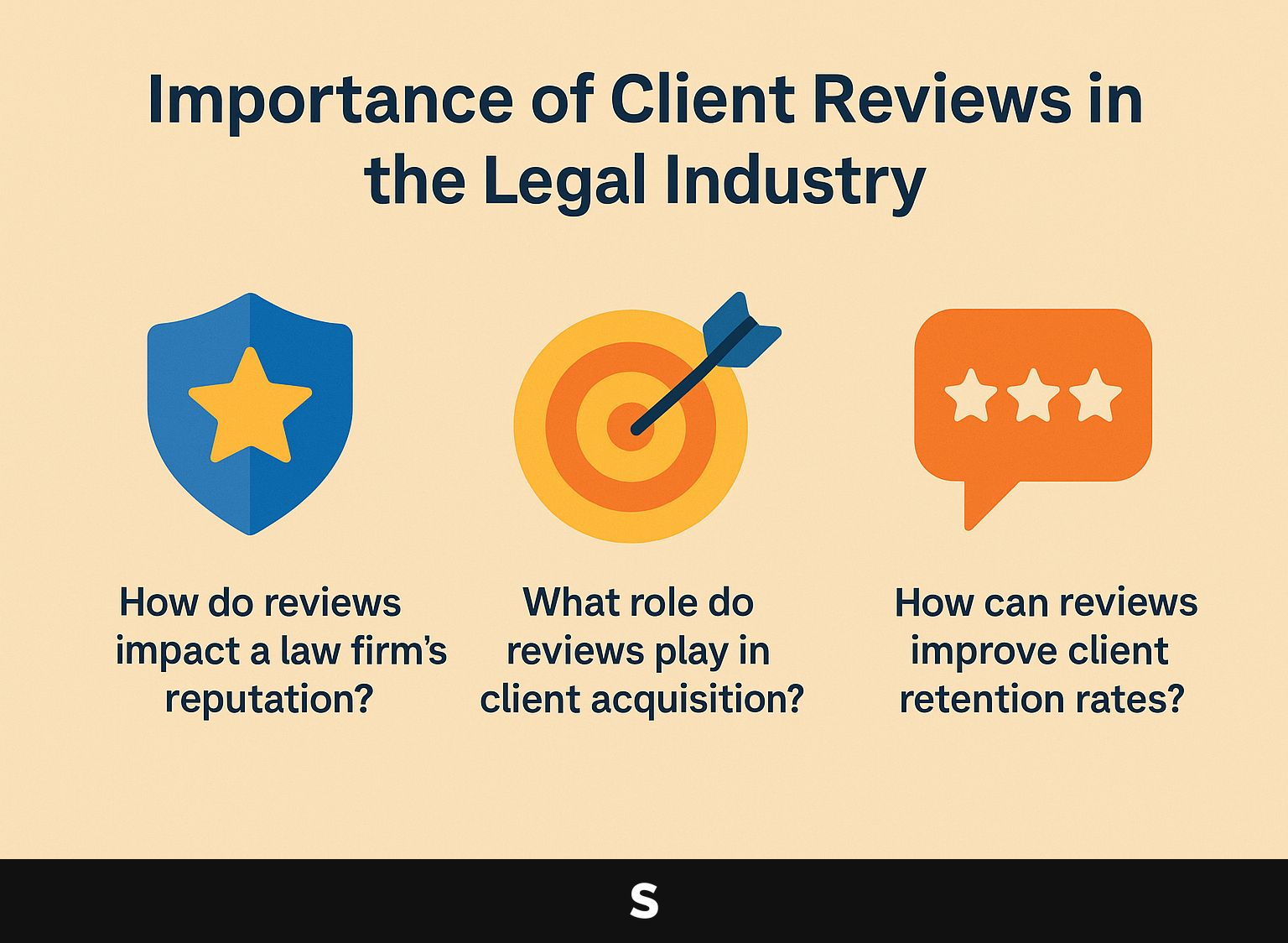
1. How do reviews impact a law firm’s reputation?
Good reviews from clients can improve a law firm’s reputation, making it more noticeable and trustworthy, which is important for staying competitive in the legal field.
Companies such as Morgan & Morgan have effectively displayed positive client feedback on sites like Google and Yelp, which has improved their visibility on the internet. This attracts new clients and strengthens loyalty with current ones.
To capitalize on this, law firms should regularly solicit feedback using tools like SurveyMonkey for client satisfaction surveys, and encourage reviews on major platforms. Responding to all reviews-good and bad-shows dedication to service and builds trust, a strategy elaborated in our Ultimate Guide To Customer Feedback Strategy.
In the end, having a good online reputation can greatly increase the number of clients who stay with you.
2. What role do reviews play in client acquisition?
Law firm reviews are an essential tool for client acquisition, with studies showing that potential clients are 70% more likely to engage a firm with positive online feedback.
To make use of this feedback, law firms should ask happy clients to leave reviews, especially after winning cases. Using tools like Google My Business and Trustpilot can simplify this process and help maintain a steady flow of positive reviews.
Firms should showcase these testimonials prominently on their websites and social media platforms, as 84% of people trust online reviews as much as personal recommendations. Replying to all reviews, whether they are good or bad, shows involvement and builds trust, which improves the company’s reputation.
3. How can reviews improve client retention rates?
Client reviews help bring in new clients and improve retention by building trust and satisfaction with current clients. Companies can gain from this by simplifying the process for customers to write reviews.
For example, using tools like SurveyMonkey or Typeform post-service allows clients to share their thoughts effortlessly. After meeting, send custom emails to clients and ask them to share their thoughts on sites like Google or Yelp. Think about giving a small reward, like a discount on next services, to encourage clients.
Regularly checking these reviews helps companies quickly deal with issues, strengthening trust and commitment to keeping clients happy.
Key Components of Trust-Building Reviews
Reviews that focus on trust include certain elements that increase their believability and usefulness, creating the basis for how a law firm is viewed by possible clients.
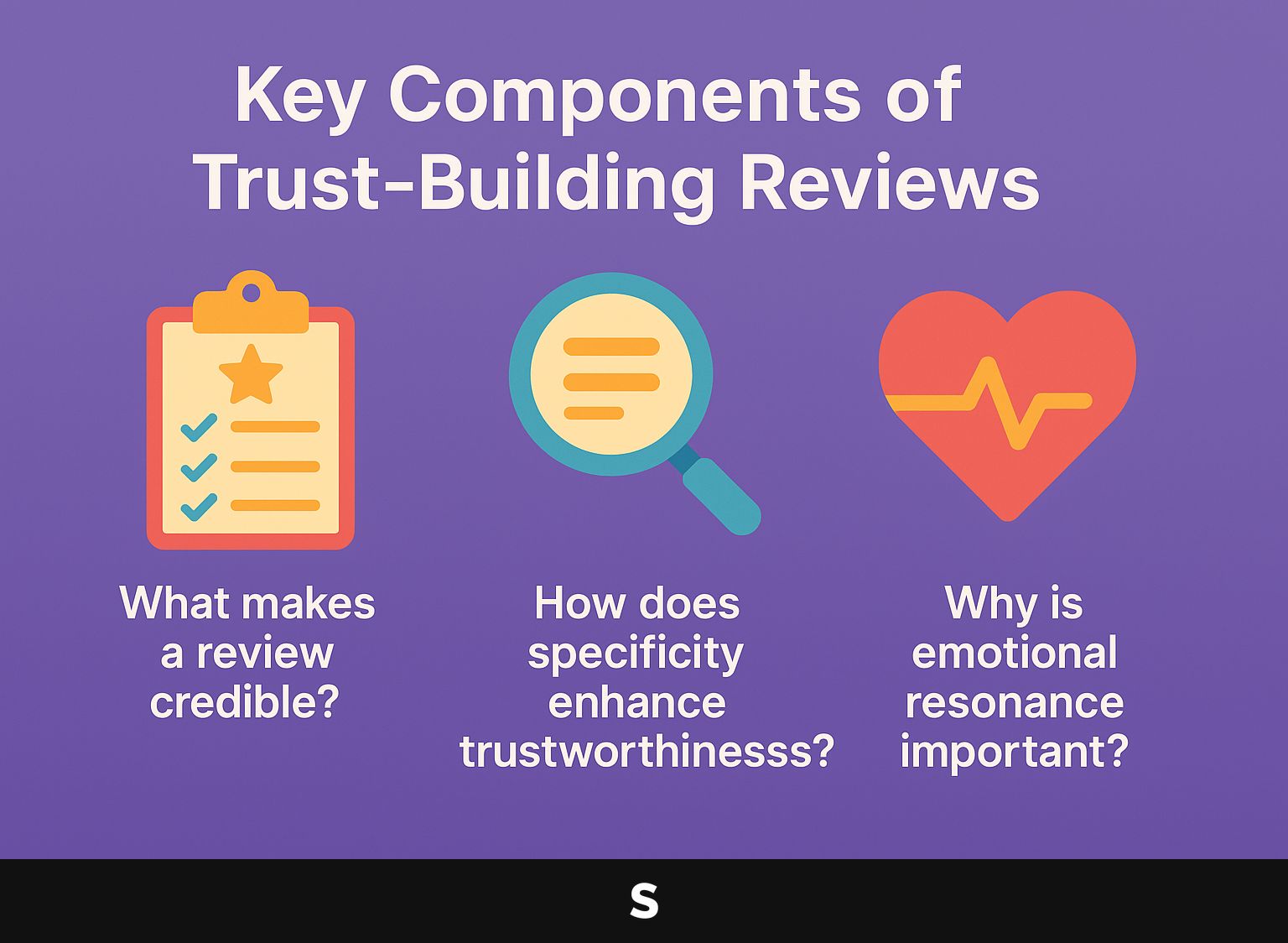
1. What makes a review credible?
A credible review is characterized by authenticity, specific details about the legal process, and outcomes that reflect genuine client experiences, as highlighted in Spokk.io’s methodology.
Reviews should include specific elements such as the attorney’s communication style, how they handled the client’s case, and the final outcomes.
For instance, a client might comment on their attorney’s responsiveness during a challenging divorce, noting, “My attorney was available at all hours and provided detailed updates.”
Adding emotions can make a message more believable; for instance, talking about feeling helped during a difficult period makes it feel more personal. Genuine stories that cover both the steps taken and feelings involved make reviews easier to connect with and believe.
2. How does being specific make a review more trustworthy?
Giving detailed reviews, such as explaining how the lawyer talks with clients or the results of their cases, makes the reviews more trustworthy and helps people decide wisely.
Urging companies to ask for detailed comments from clients can improve the quality of their reviews. For example, asking clients about the lawyer’s response time, knowledge, or level of personal attention can provide more detailed feedback.
Showcasing important case results or challenges that were successfully handled provides detail. Firms might implement a simple survey post-service, focusing on specific aspects of the experience.
Tools like Typeform or Google Forms can help with this by gathering feedback quickly and in an organized way, which makes it easy to review and display in later evaluations.
3. Why is emotional resonance important in reviews?
Showing emotions like thankfulness or relief in reviews makes them more relatable and can significantly affect how potential clients feel about a law firm.
Law firms can use the psychological effect by sharing powerful client stories in their marketing materials. Highlight clients’ experiences during tough times, concentrating on their emotional struggles and the relief they felt after receiving legal help.
Use various formats like video testimonials for a more vivid portrayal, or written stories to connect with potential clients on a deeper level.
Include these stories in your website, social media, and brochures to add a personal feel that connects with your audience’s emotions.
Types of Reviews That Build Confidence
Different types of feedback, like client testimonials, case result reviews, and star ratings, each play a role in increasing trust in a law firm.
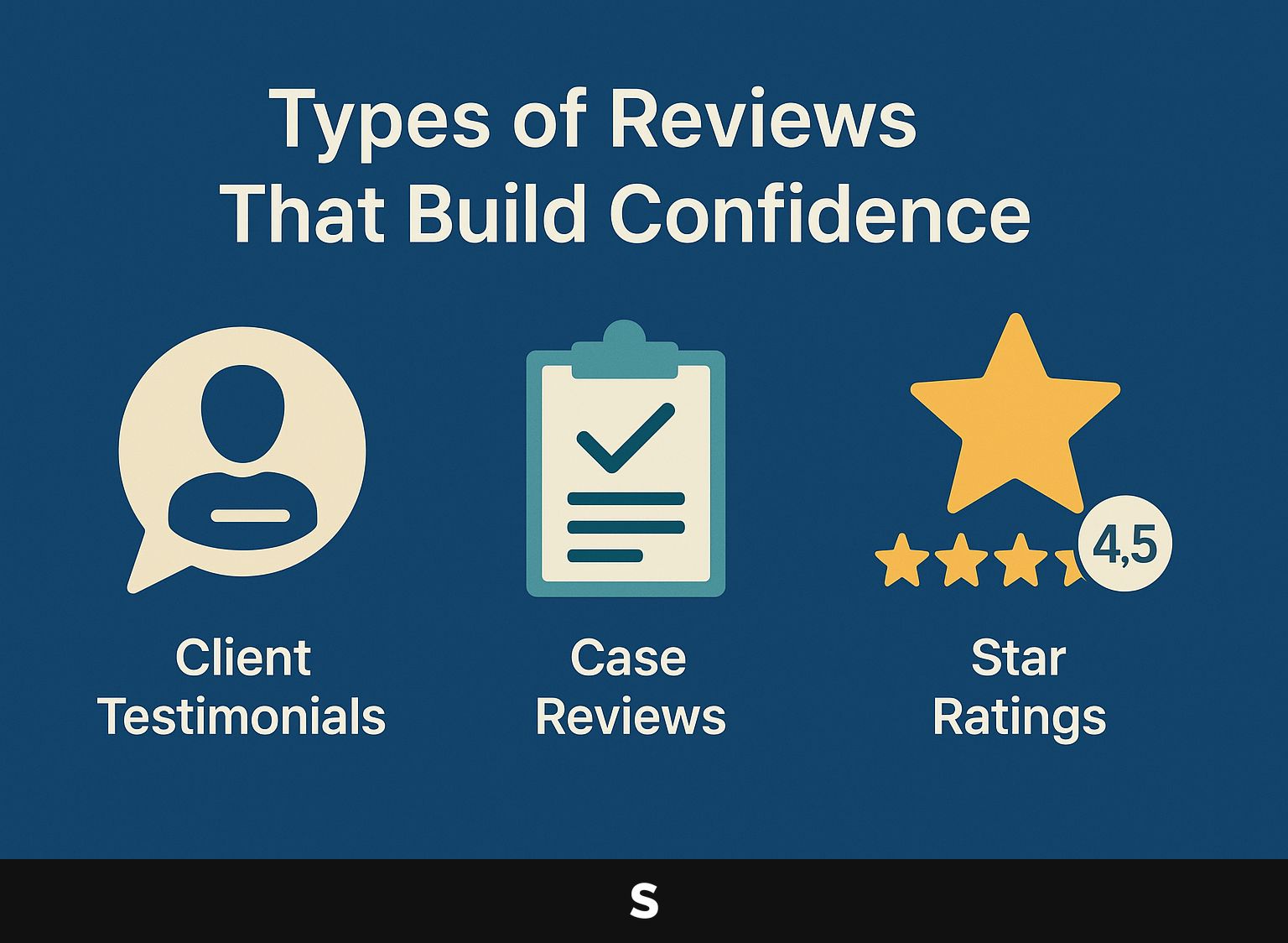
1. What are client testimonials?
Client testimonials serve as powerful endorsements, detailing personal experiences that highlight the law firm’s strengths and the attorney’s effectiveness in various legal matters.
Unlike typical reviews, testimonials highlight particular results, often including quotes such as, ‘Attorney Smith got my compensation quicker than I thought possible.’
To gather meaningful testimonials, set up a process to reach out to clients after their cases are closed. Ask for feedback by sending customized emails.
Display them clearly on your website’s main page or a specific page for testimonials, and include client photos to make them more believable. Remember, the more relatable and genuine the testimonial, the stronger its impact on potential clients.
2. How do case outcome reviews differ from general reviews?
Case outcome reviews focus on the results of legal proceedings, giving potential clients information about the firm’s success rates and experience in managing particular cases. These reviews clearly demonstrate positive results and encourage confidence among potential clients.
Law firms should actively request these reviews after favorable case completions. For instance, following a successful personal injury claim, a firm might send an email to the client thanking them and asking for feedback on their experience.
Sharing these reviews on the company’s website and social media increases visibility and confidence, demonstrating a record of positive outcomes.
3. What is the significance of star ratings and scores?
Star ratings are a quick visual representation of a law firm’s reputation, influencing client perceptions and decisions significantly, with higher scores correlating to increased trust.
To manage and improve star ratings, law firms should use various strategies.
- Encourage satisfied clients to leave positive reviews on platforms like Google and Yelp; follow up personally after case resolution to make this request.
- Respond to negative reviews quickly with polite replies and useful solutions, showing commitment to customer satisfaction.
- Regularly monitor ratings using tools like Reputation.com or Podium, allowing firms to track trends and adjust service accordingly.
These actions create a good online image and improve overall reputation.
Listening to client feedback can help lawyers offer services that meet client needs, leading to better results for everyone.
How can legal professionals effectively use client feedback to improve their practice? Start by actively soliciting reviews through follow-up emails after case resolution.
Use platforms like Google My Business or Avvo to invite clients to share their experiences. Analyze both positive and negative reviews to identify trends; for instance, high praise for communication skills may highlight a strength, while complaints about responsiveness could indicate a need for improvement.
Regularly using this feedback in practice management strategies can improve client relationships and improve service delivery.
Strategies for Encouraging Positive Reviews
Using effective methods to get positive reviews can greatly improve a law firm’s online reputation and client trust, as highlighted by Spokk.io’s specific strategies.
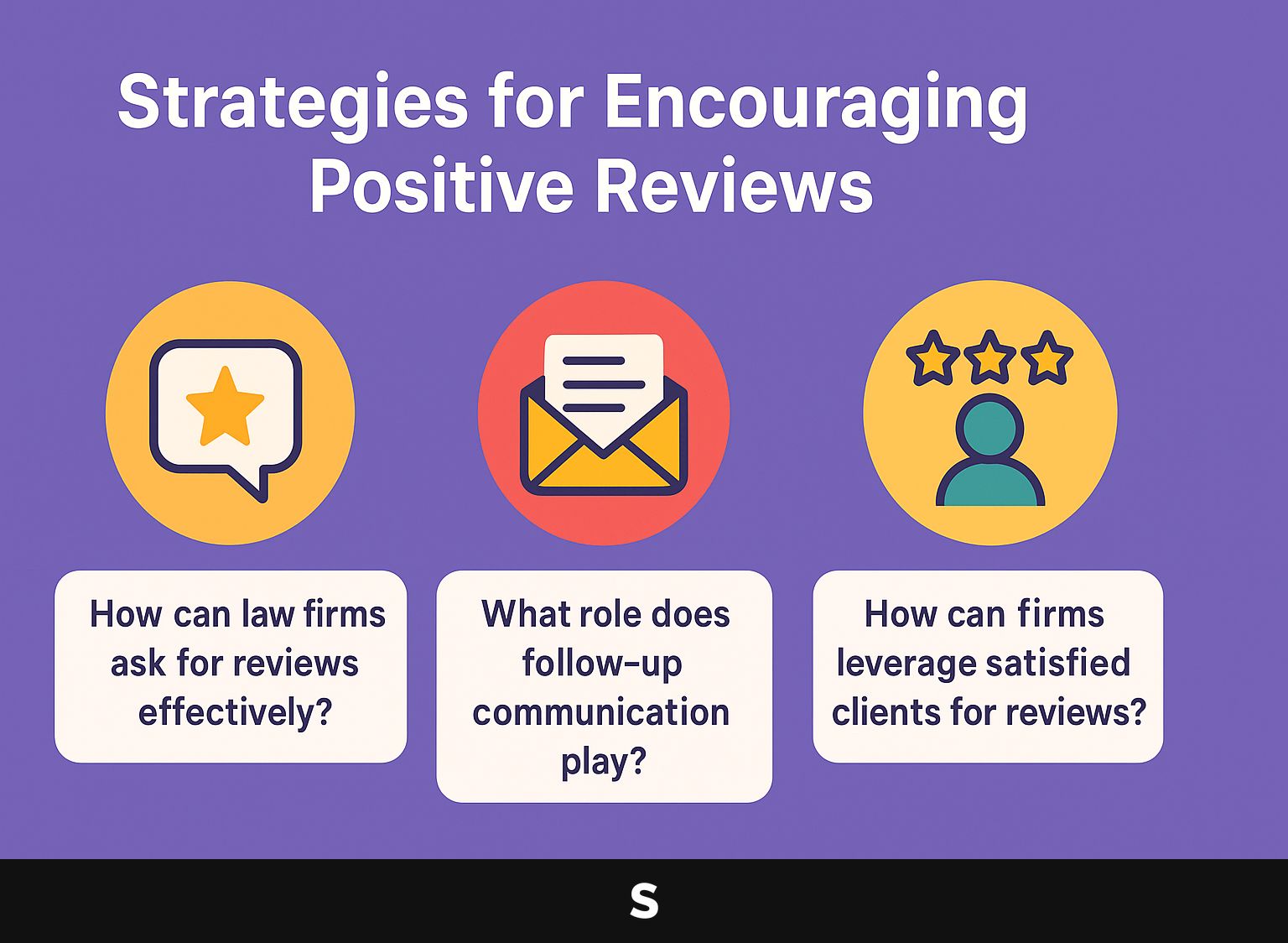
1. How can law firms ask for reviews effectively?
Law firms can effectively ask for reviews by timing the request at a moment when clients feel satisfied, such as after a successful case outcome, to maximize positive feedback.
To improve response rates, send a personal email soon after the case ends. For example, writeWe appreciate your trust in us. If you’re satisfied with our services, we’d be grateful if you could share your experience online.”
Use tools like SurveyMonkey to make a simple feedback form, letting clients share their thoughts easily. Remember to follow up a week later as a gentle reminder, helping to keep the request top-of-mind.
2. What role does follow-up communication play?
Following up with clients is important because it encourages them to leave reviews. It helps maintain relationships and reminds them of their good experiences with the firm.
To increase interaction, consider sending personalized follow-up emails or making phone calls a few days after the service is completed.
Start with a simple template: `Hi [Client’s Name], I hope you’re enjoying your [Service/Product]. We’d love to hear your feedback!’ Tailor the message by mentioning specific interactions or outcomes that align with their experience.
Mailchimp can send follow-up messages on its own while still being personal, which increases the chances of a thoughtful review. A thoughtfully written follow-up can make clients feel appreciated and encourage them to talk about their experiences.
3. How can businesses use happy clients for reviews?
Firms can ask happy clients for reviews by giving them chances to share their experiences through planned feedback requests and rewards.
Start by identifying engaged clients through surveys or feedback forms that gauge satisfaction. Once you’ve created this list, send individual emails to express gratitude for their support and request that they share their stories.
Giving small rewards, such as discounts on upcoming buys or special services, can encourage people to join. Publicly thanking clients on your website or social media can build loyalty and motivate others to share their feedback.
This approach builds a repository of testimonials that reflect genuine client satisfaction.
Managing Negative Reviews
Managing negative reviews effectively is important for maintaining a law firm’s reputation and showing commitment to client satisfaction, as demonstrated by Spokk.io’s methods.
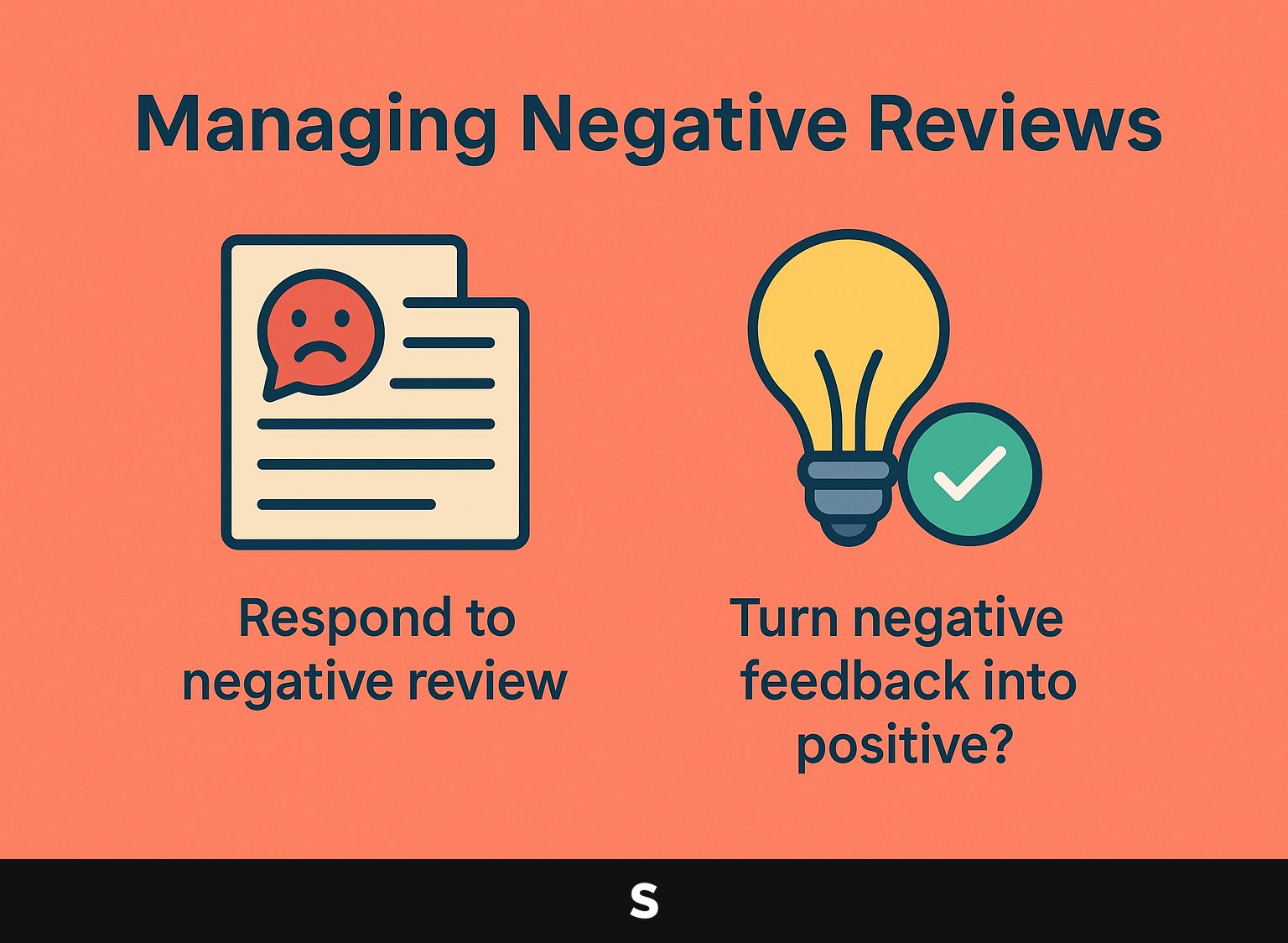
1. What should firms do when they receive a negative review?
When a law firm gets a bad review, it should reply quickly and professionally, recognize the client’s concerns, and explain the steps taken to fix the problem.
It’s important to reply within 24 hours. Begin by empathizing with the client’s feelings, for instance, saying, “I understand how disappointing this experience must have been for you.”
Explain what you are doing to fix the issue, such as providing employees with additional training. For example, a firm might share a case where they improved client communication after receiving feedback, resulting in a 20% increase in positive reviews.
Engaging with an online reputation management tool can help monitor reviews and manage responses effectively.
2. How can firms turn negative feedback into a positive outcome?
Firms can turn negative feedback into positive outcomes by addressing the concerns raised and using the situation as an opportunity to demonstrate excellent customer service.
For instance, a restaurant receiving complaints about long wait times can improve the experience by apologizing and offering diners a complimentary appetizer while they wait.
Similarly, an online retailer might follow up with customers who have reported delays, providing a discount on their next purchase as a goodwill gesture. These methods reduce complaints and can lead to positive reviews from clients who value the quick action.
Consider forming a group dedicated to managing customer feedback and responding promptly to address their concerns.
Using Reviews for Marketing and SEO
Using client feedback for marketing and SEO can greatly improve a law firm’s visibility and connection with clients, according to data-based methods from Spokk.io. This approach aligns with the principles outlined in our analysis of mastering positive review examples to boost customer engagement.
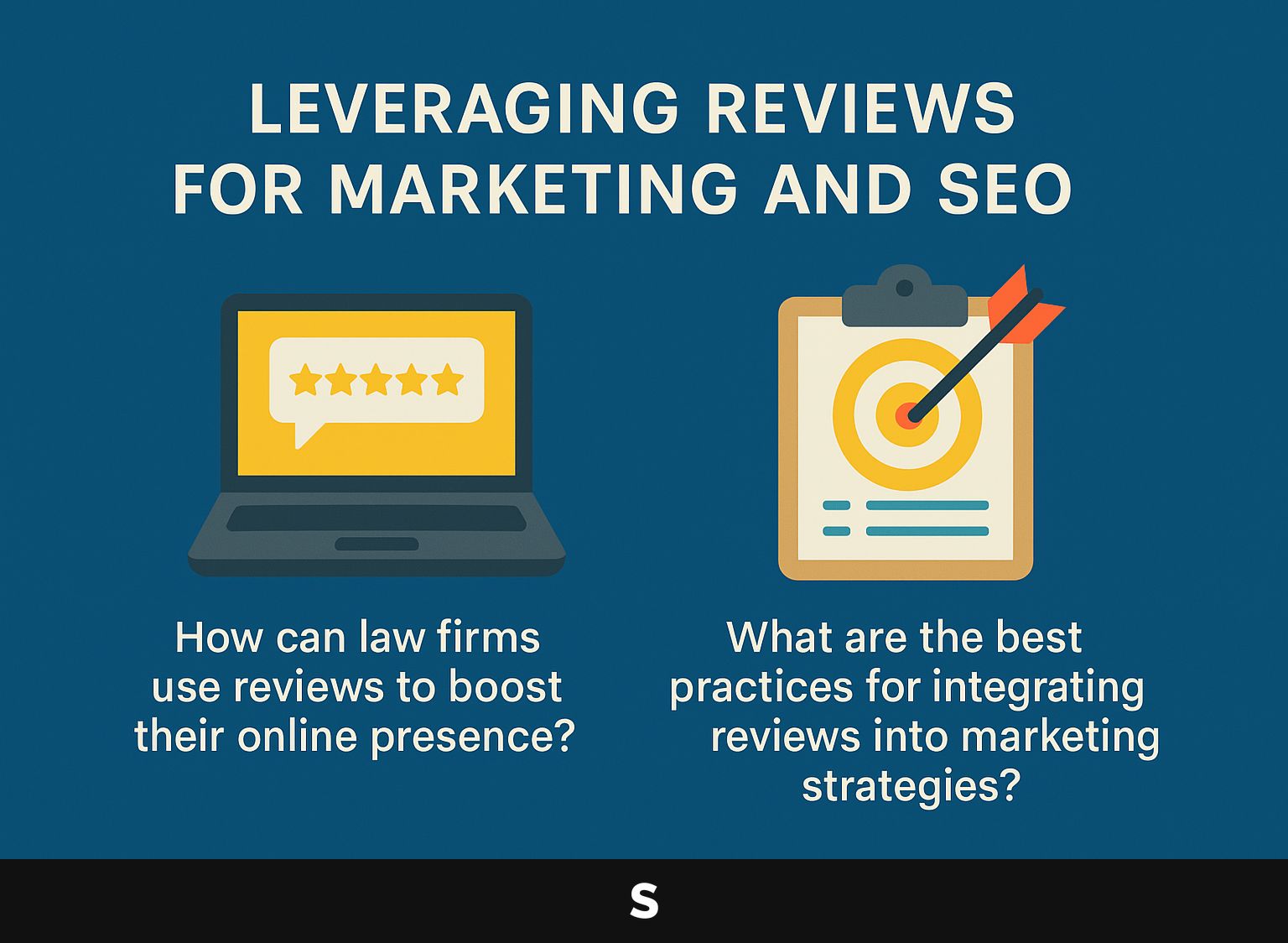
1. How can law firms use reviews to improve their online visibility?
Law firms can improve their online presence by asking clients to leave reviews on websites like Google and Yelp, which can help more people find them and bring in new clients.
To gather and showcase positive reviews, start by regularly reaching out to satisfied clients via follow-up emails or during consultations.
Use tools like Google Forms to create an easy feedback process. Once reviews are received, feature them prominently on your website’s homepage or a dedicated testimonials page.
Visit websites like Facebook and Yelp weekly to engage with reviewers, and respond promptly to both positive and negative comments. This shows appreciation and shows dedication to keeping clients happy, improving your firm’s reputation.
2. What are the best practices for integrating reviews into marketing strategies?
Putting client reviews into marketing plans means displaying positive feedback clearly on different platforms to gain trust and increase customer interaction.
To include reviews effectively, consider adding client success stories to your website’s landing pages, showing real-world impacts of your product or service. Use sections of reviews in email campaigns, ensuring they align with the interests of various audience groups.
Post testimonials with interesting images on social media. Tools like Trustpilot and Google Reviews can make it easier to collect and show customer feedback. This method using multiple channels builds trust and motivates new customers to connect with your brand.
Client Feedback: How It Has Changed Over Time
The way client reviews have changed has affected how law firms interact with their clients and promote their services, showing how important online platforms are in influencing opinions.
1. How have client reviews changed with technology?
Technology has made customer reviews more accessible and influential. Platforms such as Google and Yelp have become main places for customer feedback. These platforms let clients share their detailed experiences quickly and easily.
For instance, Google reviews enable users to rate businesses and write multi-paragraph descriptions, while Yelp focuses on rich narratives supported by photos. Businesses can reply directly to feedback, encouraging open communication that creates trust.
Features like review filtering help potential clients find relevant feedback, effectively shaping purchasing decisions. Including these reviews in marketing plans can greatly increase trust, bringing more people into stores and more interactions online.
2. What will client reviews look like in the legal field going forward?
It looks like client reviews in the legal field will soon rely more on new technologies, focusing on immediate feedback and better client interaction.
Law firms can use AI-based platforms such as Trustpilot and Podium to quickly examine feedback patterns and understand client opinions. These tools help companies quickly reply to reviews, building a feeling of closeness.
Using video testimonials from platforms like Vimeo can make your content more interesting and connect better with potential clients. When legal service providers use these technologies, they can change client reviews from simple comments into strong marketing tools, improving their online reputation and helping to attract more clients.
Legal Compliance and Ethical Considerations
Knowing the legal rules and ethical issues when asking for reviews is important for law firms to manage their reputation effectively.
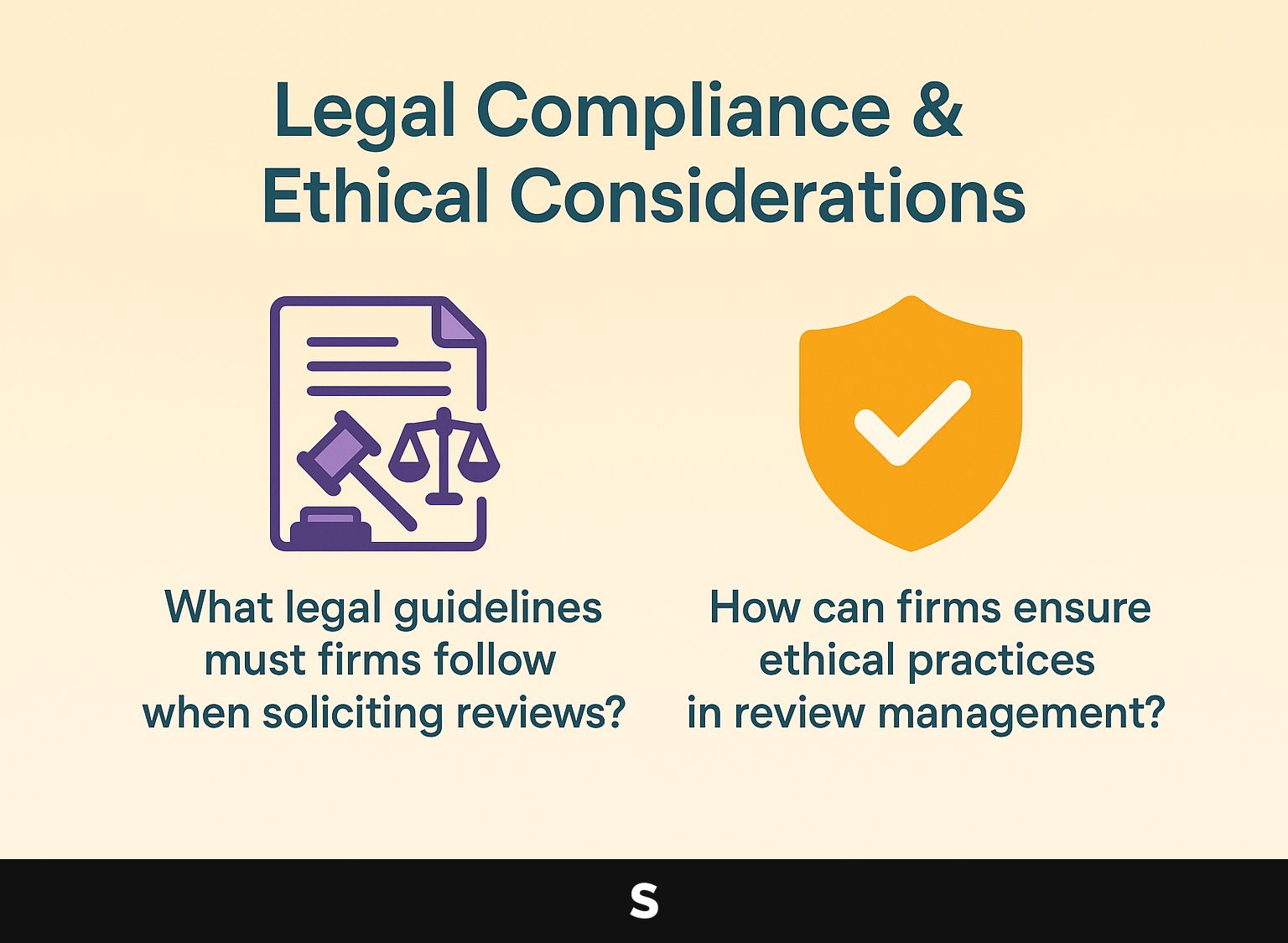
1. What legal guidelines must firms follow when soliciting reviews?
Law firms must follow specific legal guidelines when soliciting reviews, including compliance with the American Bar Association’s rules on advertising and client solicitation.
To follow the rules, law firms should be clear with clients and get their permission before asking for reviews. For example, they can send emails after the service to collect feedback, and let people know that sharing it publicly is a choice.
Avoid incentivizing reviews, as this can violate ethical standards; instead, focus on authentic client experiences. Common pitfalls include:
- Soliciting reviews in exchange for discounts
- Failing to disclose conflicts of interest
Regularly training staff on these guidelines can help mitigate risks and maintain professional integrity.
2. How can companies make sure they handle reviews ethically?
For ethical review management, companies should focus on being open, getting client permission, and keeping feedback honest, following industry guidelines.
Firms can adopt specific strategies to maintain ethical integrity in review solicitation. Talking to customers openly about the review process is important. For instance, Bombas, a sock shop, invites customers to share their thoughts after a purchase, clarifying that sharing feedback is not mandatory.
Utilizing platforms like Trustpilot allows businesses to collect reviews while providing an avenue for customers to resolve issues before public posting. This simple method creates trust and shows clearly how satisfied clients are.
Measuring the Impact of Reviews
Evaluating how client reviews affect a law firm’s work is important for seeing how well they are doing and planning upcoming strategies, as highlighted in Spokk.io’s method.
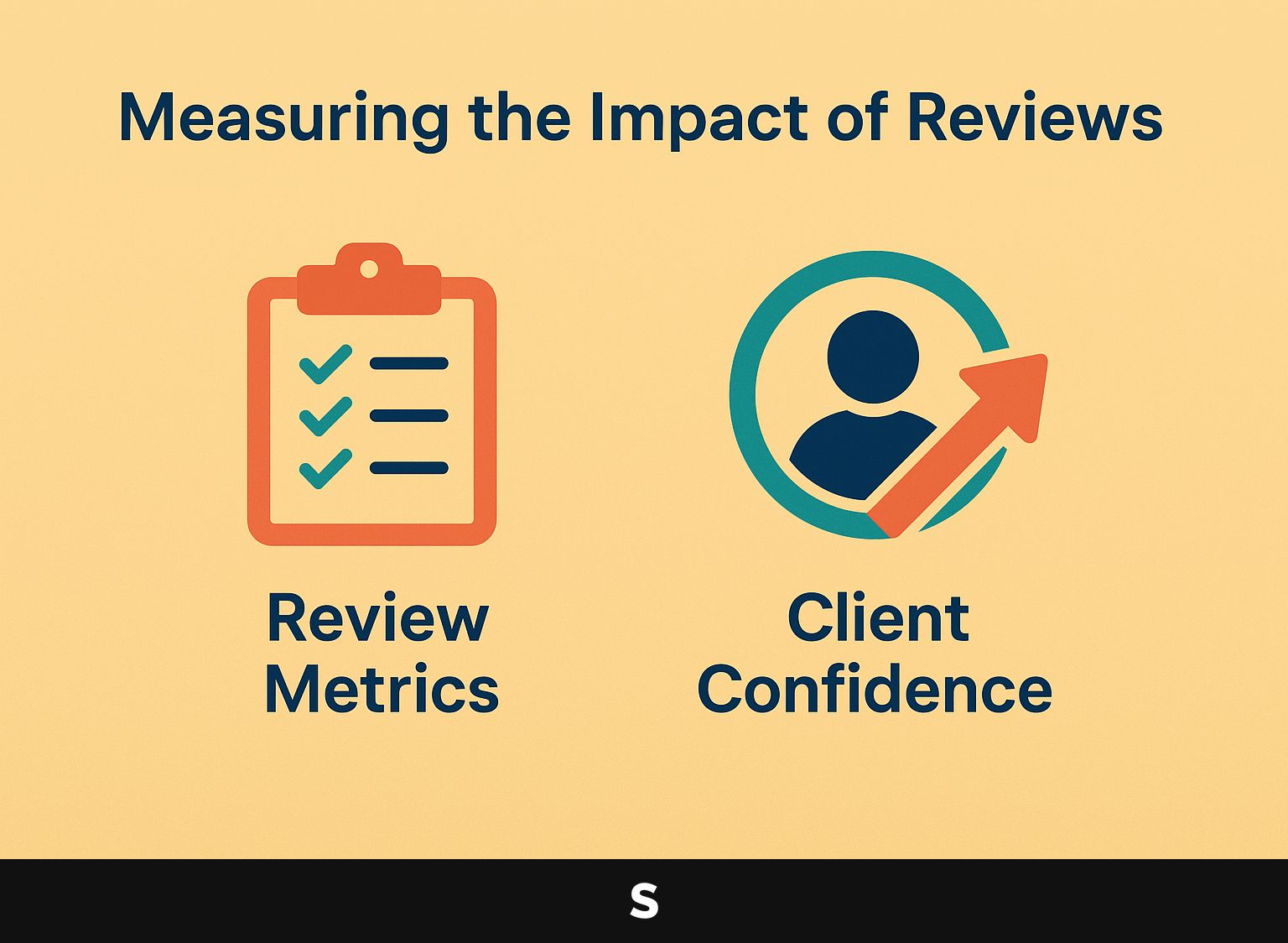
1. What metrics can firms use to assess the effectiveness of reviews?
Companies can evaluate how well reviews work by looking at things like the number of reviews, average star ratings, and the rate at which clients go from viewing to buying, to improve their plans.
Law firms should regularly track the number of reviews they receive, with the goal of seeing a consistent rise as new clients provide their feedback. Analyzing average star ratings can help identify trends; for instance, a dip in ratings may signal a need for improved client service.
Measuring client conversion rates can reveal how effectively positive reviews are driving new business-tracking this metric pre- and post-review campaigns will highlight their impact.
Tools like Google Analytics and dedicated reputation management software can help collect and understand these data points.
2. How can firms track changes in client confidence over time?
Firms can observe shifts in client trust by routinely doing client surveys, studying review patterns, and watching engagement numbers on review sites.
Start by implementing a biannual client survey to gauge satisfaction levels and identify areas for improvement. Use tools like SurveyMonkey or Google Forms for easy distribution and data collection.
Assess consumer feedback on platforms such as Yelp and Google Reviews, noting common themes in comments. Examining social media numbers such as likes, shares, and comments can show how people feel about your brand.
When companies gather this information every three months, they can find trends and adjust plans to build client confidence.
Frequently Asked Questions
1. What is the importance of law firm reviews in building client confidence?
Law firm reviews help build trust with clients by showing proof of a law firm’s skills and commitment to its clients.
2. How do positive law firm reviews reflect a firm’s professionalism and dedication?
Positive law firm reviews demonstrate a firm’s professionalism and dedication by showcasing their ability to achieve favorable outcomes for their clients and providing exceptional client service.
3. How can law firm reviews help potential clients make informed decisions?
Law firm reviews provide potential clients with information about a firm’s past results and client treatment, aiding in choosing the right law firm.
4. Why do detailed and customized law firm reviews help in increasing client trust?
Reviews that describe how a law firm has specifically helped clients are better at gaining trust. They show how the firm has been especially helpful, setting them apart from others.
5. How do law firm reviews on Spokk.io differ from other review platforms?
Law firm reviews on Spokk.io are specifically focused on building client confidence by highlighting a firm’s dedication and professionalism, rather than just rating their services.
6. How can law firms use reviews on Spokk.io to showcase their strengths and attract new clients?
Law firms can use reviews on Spokk.io to highlight their strengths and draw in new clients by using the platform to collect and share customized and detailed reviews that show their unique qualities and successful cases.



